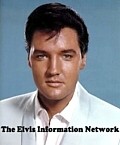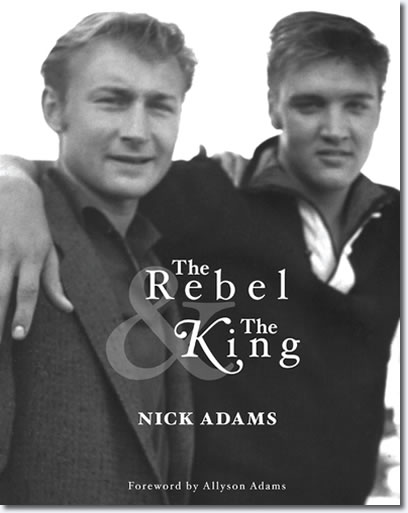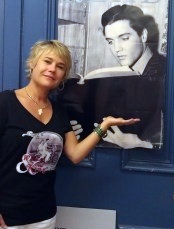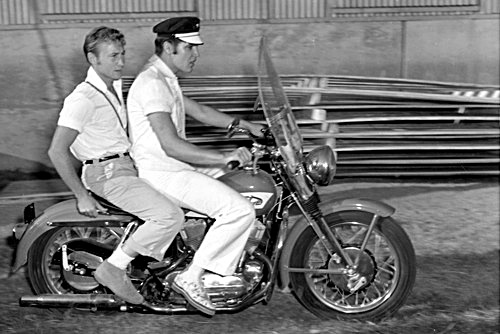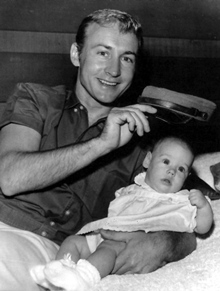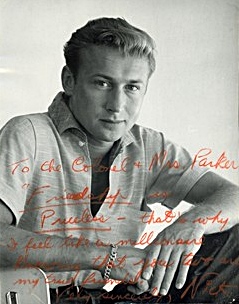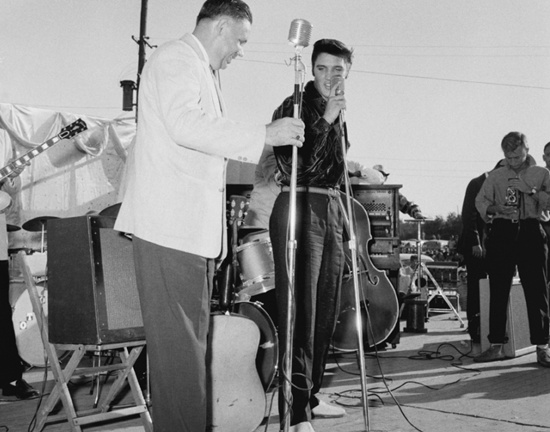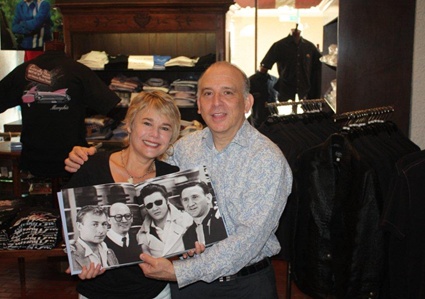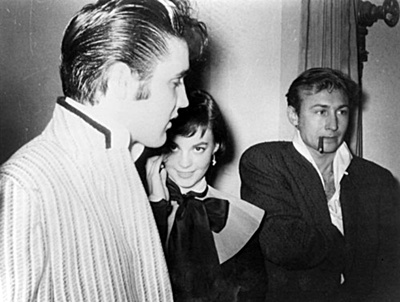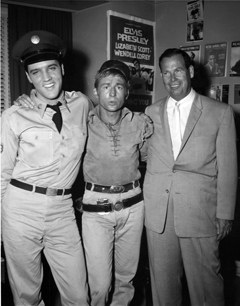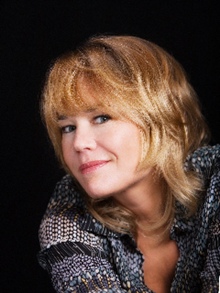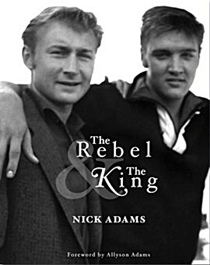 |
 |

The recent chance discovery of an original manuscript written by Nick Adams in 1956 chronicling his friendship with the young Elvis Presley has offered Allyson Adams, a writer and independent filmmaker an opportunity to learn more about her father and offered new insights into the life of Presley.
"I would rather live one day as a lion, than a thousand years as a lamb," wrote Nick Adams, in 1956. "A very great man once made that statement. And that was the first thing that came to my mind when I sat down to write this story about Elvis." - Please see below on how to get your own signed copy of the book plus free Elvis & Nick photo - EIN: Thanks Allyson for letting us talk to you. The ‘Rebel and The King’ is truly a delightful book and what a fantastic find. Allyson Adams: Thank you so much Piers, I have enjoyed our communication immensely. EIN: You tell the story of finding your daddy’s box full of memorabilia and how you’ve carried it around with you for 40 years. What made you NOT look through this box of treasures for all that time? And why did you open it now? AA: That’s such a loaded question and to be honest, this is the subject of my upcoming memoir The Daddy Box. So let’s come back to it. Ha! I’m still avoiding it. EIN: That's great that you're following this up with your memoir and more stories... How long have you been working on the memoir and have you any idea when it might be finished? AA: There are parts I wrote when I was 17, way before I opened the Daddy Box. Time to finish, don't you think? Next year. EIN: Did you grow up watching Elvis movies - knowing of your father’s connection with him? Were you a fan of Elvis’ music as a teenager? AA: I really had no idea the extent of my father’s connection with him, but I knew they were friends. When Elvis died in 1977, I felt sad for Lisa Marie because she was so young like me. And no, I didn’t listen to Elvis as a teenager. I started listening to the The Beatles White Album when I was eight and then The Jackson Five. EIN: How much do you remember of your young childhood with your father? AA: You’re going to love The Daddy Box. I remember he was fun and funny. That’s why all those famous guys liked having him around. He broke the ice and was quite entertaining.
EIN: Reading manuscript that your discovered, what was the part that moved you most? AA: I have many, but mainly finding it and then reading the first line " I would rather live one day as a lion than a thousand years as a lamb." In the book he is describing Elvis, but really he is describing himself. My father was a man of extremes, and for him GO BIG OR GO HOME, was his creed, except he couldn’t go home. It was all or nothing. AA: Yes I do and that’s definitely part of The Daddy Box, as well as all the stories I have heard over the years. I’m writing something now for Halloween about James Dean, Natalie Wood, Sal Mineo and Nick Adams, as a Hollywood Day of the Dead invocation to banish any wayward darkness that may be lingering for the Rebel Without A Cause fallen angels.
AA: Yes, I had breakfast on Elvis’ lap when I was baby. My Mom and Dad took me over to Elvis’ house to visit and hang out. We were all sitting around the table but I don’t remember, that’s what my Mom told me. Darn, no cameras, but it wasn’t that kind of thing. It was low key and real. I call that photo The Rebel’s Daughter portrait and it’s my favorite photo of my Dad and me because it seals the "Destiny factor" between us. In many ways my path has been Johnny Yuma’s legacy of wandering alone and bringing justice for the underdog.
AA: I have a very interesting relationship with Elaine Dundy, even though she is dead, and I write about it on my blog www.allysonadams.com "56 years ago in 1956," and it ain’t over yet. I know Elaine was not a fan of my father’s but she never met him and only gathered her info from interviewing people 30 years later. There has been quite a bit of rumor, gossip, speculation and negative things written about my father - and I have not read it all - about his associations with Elvis and James Dean, and whomever he seems to have hung out with. Frankly Scarlet, I don’t give a damn. I don’t need to defend my father because I wasn’t there and I don’t know what is true or not. It’s all hearsay. I love him unconditionally. I know some people say he was insecure, pushy, opportunistic and he probably was. He wanted to be movie star more than anything and he worked his tail off to achieve his dream. AA: I spoke with witnesses in Memphis during my Elvis Week journey, who remember my Dad and Elvis carrying around a typewriter during that eight days and Elvis was the one who commented "We’re writing a book!" I don’t know about the other article you are referring to. EIN: One of the real delights of your father’s manuscript is discovering what Elvis’ home life was really like at the time. Elvis was already $1 million star yet seems so innocent and such a home-comfort loving boy in your father’s descriptions of him. Do you think your father also found a family connection with Elvis’ parents? AA: Absolutely. AA: Walking and talking fast. AA: It was a different era! It’s like an episode of Mad Men. How about the description of how they treated the animals while making movies? Wiring sharks mouths shut so they could swim with actors, and letting a boa constrictor suffocate and eat a tiger? If that happened today, PETA would blow a gasket.
The Tupelo fair Elvis and Nick Adams with camera far right.
AA: I loved it because my father wanted to be noticed and accepted, and Elvis did that. Elvis wasn’t jealous about others success like most people in Hollywood and that was so refreshing to my father. Also Elvis had this ability to see a movie once and repeat all the dialogue verbatim, plus act out all the parts, and was that way with music too. Elvis had uncanny, natural gifts. AA: That we all have these defining moments in our lives when we make powerful choices to create a better life for ourselves no matter what the odds. It reminded me of how people in America (and the world too) feel now during these hard economic times. Elvis and my Dad’s story is a good old fashioned rags to riches American tale. EIN: In the book your father describes Elvis’ generosity and a one point says that every time they went shopping if Elvis bought anything he would also buy one for your father as well. Do you have any idea what happened to all his personal possessions? There would be some fantastic memories there? AA: Coincidentally, when I was in Memphis at the Peabody Hotel during Elvis Week, I had just been on the news talking about Elvis and my Dad riding in Elvis’ Messerschmitt, and the bartender recognized me and said "Elvis gave that Messerschmitt car to Hal Lansky’s father and that’s his store right there." So I met Hal Lansky of the Lansky Brothers Clothiers and he showed me a picture of my Dad with Elvis and the Lansky Brothers. I had seen that same photo of Elvis a hundred times but my Dad was cut out of the picture. But now here he was. This is the store where Elvis bought a lot of his clothes and eventually traded the car for a bunch more.
AA: Another one of my favorite parts in the book that gives insight into my father’s inner world. I also took the liberty of adding a portion from a letter my Dad wrote in 1949, the year before he left for Hollywood, where he muses about his future and his life as a peasant. That’s such a telling moment because it shows his vulnerability and also part of he, Elvis’ and Natalie’s bond. Natalie was also Ukrainian like my Dad, and these were young kids with big dreams who came from nothing and they were making it! It’s such a priceless, innocent time for any artist that is on the brink and then it’s never the same again. Your star rises and life is changed, and it certainly was for Elvis and Natalie Wood. She reached an incredible pinnacle at a very early age, did beautiful work and was quite the randy one. AA: Like I say, this is my first Elvis barbecue and I learn things everyday. I am not aware of it but as I mention in my foreword, my father wrote an article called "I Defend Elvis" that was taken from the much longer manuscript. You would be surprised that a lot of what my father wrote about Elvis during that trip became some of the first things people learned about the real Elvis. Many famous Elvis photos during that time have Nick cropped out of them, but he was there! There had been so many lies and misconceptions written about Elvis attacking his faith and character, mostly from jealousy, that Elvis cooperated with Nick very closely to give a truer vision of himself. EIN: Gerald Billion tells the story of being in Elvis’ house when your father and Natalie Wood came in. He noted that "Nick was wearing jeans and Natalie was barefoot, wearing black pedal-pushers with a leopard-skin designed vest". He said he liked your father because he and Natalie were such nice "normal people" and with no airs and graces. AA: Can’t wait to read it. AA: The more I learn about Elvis, the more I understand what a tragedy the end of his life was - not unlike my own father's - and that's why I'm so grateful that my introduction to Elvis was through my Dad's eight days in Memphis with him. This little time capsule is a highlight of Elvis' rocket to historical notoriety. The last glimpse of innocence before the end of an era. Unfortunately, it ate him up. Iconic fame has a price tag, and sometimes it ends up on the end of your toe in a morgue . And this question certainly hits close to home and the territory I cover in the Daddy Box. Addiction and alcoholism are family diseases and they play themselves out in many ways. There is so much stress and pressure for any public figure, that I don’t think people realize that celebrities are people too. Great artists are sensitive souls that are thrust into a lion’s game to which some fair better than others. It’s a tough racket. This is Hollywood folks, not Bozeman.
AA: 'A Little Less Conversation' (JXL Radio Mix) is my favorite Elvis song and I play it for inspiration to get going. I have learned so much about Elvis World and my father since I published this book only two months ago that my heart and mind are full with lore, genealogy, music, the rawest magic of any living performer to walk this earth, rumor, speculation, homespun god lovin' folk with the warmest hospitality, fans, connections, spirit visitations, where would you like me to start? In many ways I am still soaking it all in, but I am thrilled to be part of it all. The best part of Elvis, of course, is his music, and no matter what I hear or see of him, I love him truly, madly, deeply. Finally, after all these years I get it. Looks like I saved the best for last. EIN: Thanks so much for talking so honestly with us Allyson about Elvis and your father. And good luck with the memoir - 'The Daddy Box' is sure to be an amazing tale.
Interview by Piers Beagley. Click here to comment on this interview
EIN Website content © Copyright the Elvis Information Network.
Elvis Presley, Elvis and Graceland are trademarks of Elvis Presley Enterprises. The Elvis Information Network has been running since 1986 and is an EPE officially recognised Elvis fan club.
|
|
